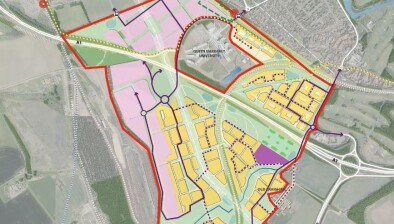Housing secretary signals intention to unlock Blindwells potential

Màiri McAllan
East Lothian Council has welcomed the Scottish Government’s signal of intent to work with the local authority and private sector partners to unlock investment in the Blindwells new settlement.
Cabinet secretary for housing Màiri McAllan highlighted Blindwells’ potential to deliver 10,000 new homes as part of her Ministerial Statement on tackling the National Housing Emergency given to the Scottish Parliament on Tuesday, 2 September.
Land for a potential expansion of Blindwells is currently safeguarded in the council’s local development plan. The authority has been working with Scottish Futures Trust and the landowners and master developers involved, Hargreaves and Taylor Wimpey, to test the potential for a strategic expansion of Blindwells to create a vibrant new town on this previously developed site within the former East Lothian coalfield.
The emerging vision is to transform the Blindwells Development Area into an influential, innovative, healthy and net zero new community that is a vibrant destination and attractor. Blindwells has potential to deliver 10,000 new homes, including 2,500 affordable homes, as well as a new strategic town centre and strategic employment opportunities, plus new education, community, healthcare and other essential infrastructure.
The council submitted a Strategic Outline Business Case, prepared in conjunction with Scottish Futures Trust and the landowners and developers involved, to the Scottish and UK Governments in late August this year. This business case highlights the site’s potential, if support can be provided by both Governments for an infrastructure first delivery strategy and to support additional capacity in services, to deliver significant economic and wider benefits at local, regional, national and UK level.
Blindwells is one of seven strategic housing sites across the Edinburgh and South East Scotland City Region Deal area (Edinburgh, East Lothian, West Lothian, Midlothian, Fife and the Scottish Borders) identified as key areas of change and growth which with Government support to deliver will help to alleviate the National Housing Emergency.
While the council indicated that further business case stages are required through to an anticipated timescale of 2029, the Minister’s remarks provide a positive signal for this ongoing collaborative work.
East Lothian Council leader, Councillor Norman Hampshire, said: “Blindwells offers a strategic long-term opportunity to accommodate growth while delivering significant employment opportunities and economic benefits for our communities, and the wider region and beyond. Tuesday’s announcement recognises Blindwells’ potential role in alleviating the National Housing Emergency.
“As outlined in our Strategic Outline Business Case, financial support from both Scottish and UK Governments will be essential to realise this ambition and all of the opportunities Blindwells offers – in particular to develop the necessary shared public infrastructure and to provide additional capacity in services. The business case process will allow us to explore a strategic approach that can minimise risk, manage the amount of growth that may be directed to existing communities in future as well as maximise benefits at local, regional, national and UK level.
“We welcome the opportunity to progress these matters and remain committed to working through the Edinburgh and South East Scotland City Region Deal, with both Governments and landowners to unlock Blindwells’ full potential and the benefits it can deliver.
“Once there is greater clarity on the level of support, we will be in a position to consult communities with proposals on the way forward for Blindwells, before taking any decisions on how any potential Blindwells expansion may be reflected in future plans and strategies.”
An initial analysis of the strategic impact Blindwells can deliver reveals the potential for significant economic and wider benefits at local, regional, national and UK level, including:
- Around £2 billion in construction phase
- Around £7.5bn when operational (over 30 years)
- Around 1,000 jobs per year in construction phase
- Around 4,000 jobs supported/created in operation
- Around £2.5-£2.8bn private investment leverage

















